 Industries that rely on multiple electrical control panels are among the most obvious beneficiaries of modern heat exchanger technology. Designed specifically to transfer electrical waste heat in an efficient, eco-friendly, and reliable manner, heat exchangers first grew in popularity as alternatives to more cumbersome air conditioning units that companies relied on in the past. However, with their high-performance capabilities and adaptability to virtually any application’s needs, heat exchangers are also commonly used for more than just cooling control panels, and they excel at every application for which they’re employed. (more…)
Industries that rely on multiple electrical control panels are among the most obvious beneficiaries of modern heat exchanger technology. Designed specifically to transfer electrical waste heat in an efficient, eco-friendly, and reliable manner, heat exchangers first grew in popularity as alternatives to more cumbersome air conditioning units that companies relied on in the past. However, with their high-performance capabilities and adaptability to virtually any application’s needs, heat exchangers are also commonly used for more than just cooling control panels, and they excel at every application for which they’re employed. (more…)
High-Performance Thermal Management for the Molding Industry
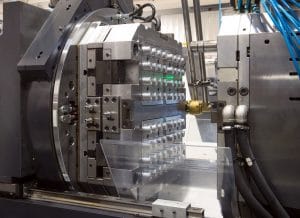 Thermal management is important to every industry for a wide variety of reasons. Some companies simply need efficient ways to cool large manufacturing equipment or electrical control panels. Others, however, rely on thermal management as a vital part of their production process, as is the case with the molding industry. By definition, molding relies on the rapid and efficient application and removal of heat—something that heat exchanger technology is specifically adept at. Thermal pins, which are specialized heat pipes made specifically for all types of molding, bring the high-performance capabilities of heat exchangers to an industry that depends on the efficiency and precision of its thermal management solutions. (more…)
Thermal management is important to every industry for a wide variety of reasons. Some companies simply need efficient ways to cool large manufacturing equipment or electrical control panels. Others, however, rely on thermal management as a vital part of their production process, as is the case with the molding industry. By definition, molding relies on the rapid and efficient application and removal of heat—something that heat exchanger technology is specifically adept at. Thermal pins, which are specialized heat pipes made specifically for all types of molding, bring the high-performance capabilities of heat exchangers to an industry that depends on the efficiency and precision of its thermal management solutions. (more…)
3D Printing Makes for Better Heat Exchanger Manufacturing
 Part of excelling in the thermal management industry is being able to provide clients with advanced solutions quickly and with consistently high quality. For instance, centralizing the design and manufacturing process within a single facility eliminates risks of specifications being lost in translation. It also shortens the time between a products conception and manufacturing. To ensure the level of quality that clients rely on, we also employ 3D printing for rapid prototyping of tools and components, which allows us to iron out the little things before a product goes into final manufacturing. (more…)
Part of excelling in the thermal management industry is being able to provide clients with advanced solutions quickly and with consistently high quality. For instance, centralizing the design and manufacturing process within a single facility eliminates risks of specifications being lost in translation. It also shortens the time between a products conception and manufacturing. To ensure the level of quality that clients rely on, we also employ 3D printing for rapid prototyping of tools and components, which allows us to iron out the little things before a product goes into final manufacturing. (more…)
Why Heat Pipes Make Great Heat Exchangers
 A significant part of what makes heat exchanger technology more efficient than other thermal management solutions is the fact that they don’t require complicated machinery or constantly moving equipment. In addition to the advanced methods of transferring heat that they employ, their simplified designs impact their ability to minimize energy and maintenance requirements. In many cases, heat pipes make the most of these benefits, making them the ideal heat exchangers for a wide variety of applications. (more…)
A significant part of what makes heat exchanger technology more efficient than other thermal management solutions is the fact that they don’t require complicated machinery or constantly moving equipment. In addition to the advanced methods of transferring heat that they employ, their simplified designs impact their ability to minimize energy and maintenance requirements. In many cases, heat pipes make the most of these benefits, making them the ideal heat exchangers for a wide variety of applications. (more…)
Heat Exchanger Technology’s Influence on Green Energy
 Modern heat exchangers were first introduced as a way to save energy and costs for thermal management, so it may be no surprise that the technology has had a notable influence on subsequent green energy efforts. With the ability to use more natural methods of transferring heat than air conditioning or air compression, heat exchangers eliminate the need for additional complex machinery to keep other equipment properly cooled. The same methods, such as conduction, convection, and phase-change cooling, have influenced how technicians and designers think of heat and energy, which has had an impact on the development of larger scale green energy efforts. (more…)
Modern heat exchangers were first introduced as a way to save energy and costs for thermal management, so it may be no surprise that the technology has had a notable influence on subsequent green energy efforts. With the ability to use more natural methods of transferring heat than air conditioning or air compression, heat exchangers eliminate the need for additional complex machinery to keep other equipment properly cooled. The same methods, such as conduction, convection, and phase-change cooling, have influenced how technicians and designers think of heat and energy, which has had an impact on the development of larger scale green energy efforts. (more…)
Why Heat Exchangers Almost Always Work Best
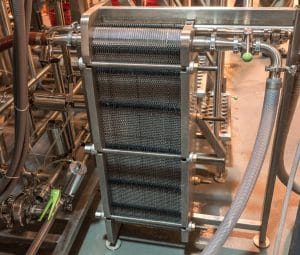 In the realms of electrical and industrial thermal management, every application is unique. Therefore, there is no single solution that generally works best. To meet such a wide variety of needs efficiently and effectively, heat exchangers offer eco-friendly thermal management solutions that address nearly every industry and application’s specifications. Heat exchangers themselves come in various forms, and collectively, the thermal management technology has become the most frequently implemented solutions for applications of all sizes. (more…)
In the realms of electrical and industrial thermal management, every application is unique. Therefore, there is no single solution that generally works best. To meet such a wide variety of needs efficiently and effectively, heat exchangers offer eco-friendly thermal management solutions that address nearly every industry and application’s specifications. Heat exchangers themselves come in various forms, and collectively, the thermal management technology has become the most frequently implemented solutions for applications of all sizes. (more…)
Why Cold Plates Are Popular for Industrial Thermal Management
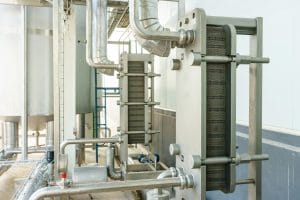 In addition to optimizing the science of thermal management, one of the greatest advantages that heat exchanger technology offers today’s industries is the ability to adapt to a wide variety of unique needs. For instance, many industries rely on thermal management for more than just cooling control panels, and many of those applications require the transfer or control of heat in areas much larger than an electrical enclosure. To address larger-scale thermal management needs, companies often rely on cold plate heat exchangers, which can apply the efficient and eco-friendly benefits of heat exchanger technology to an increasingly wider variety of applications. (more…)
In addition to optimizing the science of thermal management, one of the greatest advantages that heat exchanger technology offers today’s industries is the ability to adapt to a wide variety of unique needs. For instance, many industries rely on thermal management for more than just cooling control panels, and many of those applications require the transfer or control of heat in areas much larger than an electrical enclosure. To address larger-scale thermal management needs, companies often rely on cold plate heat exchangers, which can apply the efficient and eco-friendly benefits of heat exchanger technology to an increasingly wider variety of applications. (more…)
Common Hindrances to Efficient Thermal Management
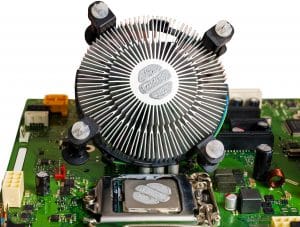 Every new technology comes with its own set of hurdles and challenges, but thermal management is something that all forms of technology must account for. Every computer processor and mechanical piece of equipment relies on some sort of cooling solution to prevent disastrous overheating. Typically, the solution chosen has a significant effect on the technology’s efficiency, which is why industries rely increasingly more on heat exchangers to overcome common hindrances to efficient thermal management. (more…)
Every new technology comes with its own set of hurdles and challenges, but thermal management is something that all forms of technology must account for. Every computer processor and mechanical piece of equipment relies on some sort of cooling solution to prevent disastrous overheating. Typically, the solution chosen has a significant effect on the technology’s efficiency, which is why industries rely increasingly more on heat exchangers to overcome common hindrances to efficient thermal management. (more…)
Heat Exchangers for Applications Outside of the Warehouse
 Some of the most well-known benefits of modern heat exchangers are the cost and energy savings they bring to manufacturing operations. They’ve also become increasingly more recognized for bringing those same benefits to smaller, highly precise applications, like cooling high-performance electronics and computer processors. For some industries, though, the most impactful benefit of heat exchangers is their ability to operate continuously and reliably in hazardous conditions. They can ensure optimal thermal management while maintaining the integrity of the equipment that the heat exchangers are affixed to. (more…)
Some of the most well-known benefits of modern heat exchangers are the cost and energy savings they bring to manufacturing operations. They’ve also become increasingly more recognized for bringing those same benefits to smaller, highly precise applications, like cooling high-performance electronics and computer processors. For some industries, though, the most impactful benefit of heat exchangers is their ability to operate continuously and reliably in hazardous conditions. They can ensure optimal thermal management while maintaining the integrity of the equipment that the heat exchangers are affixed to. (more…)
Important Ways Heat Exchangers Change Manufacturing
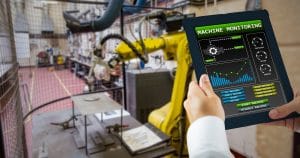 The field of manufacturing is often a proving ground for new technologies. For instance, manufacturing was the stage upon which automation first became a game-changer, and how the technology would affect manufacturing was one of the most talked-about impacts of it. Not long before that, the same was true for heat exchangers and the way manufacturers approached electrical thermal management. Today, heat exchangers still have notable impacts on the manufacturing industry. By simplifying thermal management, they help manufacturing equipment run more smoothly for longer while simultaneously reducing energy consumption. (more…)
The field of manufacturing is often a proving ground for new technologies. For instance, manufacturing was the stage upon which automation first became a game-changer, and how the technology would affect manufacturing was one of the most talked-about impacts of it. Not long before that, the same was true for heat exchangers and the way manufacturers approached electrical thermal management. Today, heat exchangers still have notable impacts on the manufacturing industry. By simplifying thermal management, they help manufacturing equipment run more smoothly for longer while simultaneously reducing energy consumption. (more…)







